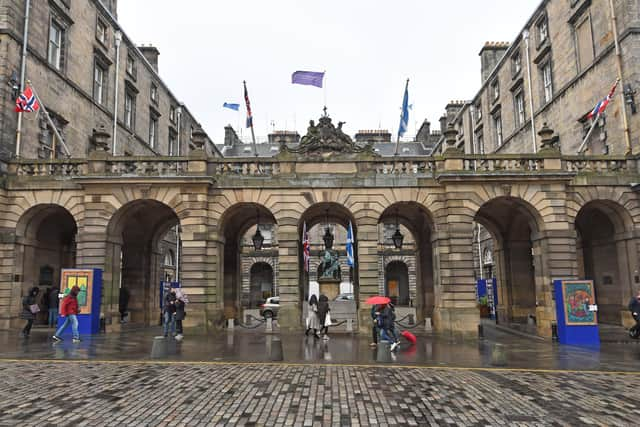Edinburgh council: What will minority Labour rule mean for Edinburgh?
Let us know what you think and join the conversation at the bottom of this article.
Labour has managed to pull off quite a feat by forming a minority administration to run the Capital despite holding only 13 out of the 63 seats on the council.
Giving non-political posts to the Lib Dems and Tories allowed the party to take control, seeing off the rival bid from its former partners the SNP who had teamed up with the Greens.
Advertisement
Hide AdAdvertisement
Hide AdBut without any ongoing deals with other parties, Labour will now have to work hard to secure support on an issue-by-issue basis over the next five years.
So what lies ahead for Edinburgh under Labour rule?
Working with other parties
A minority administration is not new. The SNP-Labour coalition which ran the city for the past five years did not have a majority. But for an administration of just 13 councillors and with 50 opposition councillors facing them, the task will be a lot harder. Eight of Labour's 13-strong group are new to the council and now face a baptism of fire.


The committee conveners will have their work cut out trying to make sure they can get support for any contentious plans they want to get through. And there will be constant potential for problems to arise.
There are plenty of issues where most or all of the parties agree, so not everything should be a battle. But where there is not a natural majority for matters which Labour wants to press, they will need to negotiate with other parties for their backing.
Group leader Cammy Day worked closely with SNP opposite number Adam McVey during their five years leading the last administration and they had a good relationship. But whether that survives Labour's success in blocking the plans for an SNP-Green coalition remains to be seen.
Halt on some transport initiatives


Some of the controversial transport policies of the last administration now face an uncertain future. Although Labour is pledged to combat climate change and tackle congestion, it is no longer signed up to the Workplace Parking Levy it once supported and which an SNP-Green coalition would have been eager to introduce; and Labour is unlikely to adopt the SNP's election proposal for a congestion charge at the city boundary targeted at commuters driving into the city from neighbouring authorities.
The Labour manifesto did commit to improving and extending a network of safe and protected cycle routes and developing low traffic neighbourhoods but insisted there would be "proper local community involvement in the plans".
Pinning blame for cuts on SNP
Many Labour councillors were annoyed during the last administration that the SNP council leadership did not do enough to press the SNP Scottish Government for better funding for Edinburgh. Labour on its own is certain to be more "political" in its approach, laying the blame for the impending funding crisis firmly at the government's door and campaigning for a fairer funding settlement.
Advertisement
Hide AdAdvertisement
Hide AdLabour's manifesto promised to "fight cuts in services" but it is difficult to see how they will avoid the well-flagged need for big budget savings in 2023/24. Having to wield the spending axe, however reluctantly, will be difficult and potentially damaging for the party.
No to outsourcing services
The issue of budget savings could well see calls from the Conservatives and perhaps the Lib Dems for council services to be outsourced. But Labour is firmly opposed to any such moves, and is similarly committed to a policy of no compulsory redundancies. On these issues the new administration could find itself at odds with the two parties who helped it into power but with allies in the SNP and the Greens, who would help see off any unwelcome proposal.
Labour’s manifesto said it was committed to maintaining council provision of public services and bringing back into the council those that have been contracted to external providers, arguing that would improve the quality of services and the working conditions of those who carry out the work. There was a specific promise to establish a directly-employed council construction team to build and fit out new council homes. And Labour, like all the parties, is pledged to keep Lothian Buses in public ownership.
Keeping care homes open
Labour is pledged to oppose the care home closures which were proposed last year as part of a reorganisation of care provision in Edinburgh. Instead Labour wants to upgrade the homes, build new ones where needed and expand council provision. But the decision will be made by the Edinburgh Integration Joint Board (EIJB), which is responsible for health and social care in the Capital. It is made up of representatives from the council and NHS Lothian and it is not clear whether Labour’s preferred approach will necessarily carry. Labour’s Edinburgh manifesto at the elections included a promise to campaign for reform of the arrangements for oversight of local health and social care provision.
Changing council culture
There were complaints during the last five years about a toxic culture at the council. An Audit Scotland "Best Value" report highlighted "tensions between elected members which manifest in inappropriate language and tone being used in council debate". Parties blamed each other and the situation seemed not to improve. But a new administration could provide an opportunity for a fresh start. The Lib Dems said they had ruled out a deal with the SNP because they felt they were not going to change their “arrogant” approach, but Labour was more open to “recognising some of the mistakes”.
And Labour’s Scott Arthur tweeted ahead of the council meeting: “This won’t just be a change in leadership, it will also be a change in culture. We will focus on what we have in common with other parties.”
Comments
Want to join the conversation? Please or to comment on this article.